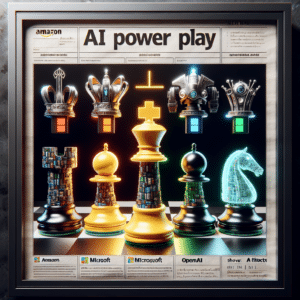Artificial intelligence (AI) has become an integral part of our lives, revolutionizing various industries and promising a brighter future. However, despite the impressive gains made in AI technology, there are still limitations to be addressed. Existing AI systems, such as the leading large language model GPT-4, learn patterns from extensive datasets but lack true insight. This has led to questions about whether AI can provide solutions to complex problems like Wordle, a popular online game where players guess words based on clues. The idea of feeding four previous guesses to GPT-4 to see if it can suggest a solution has created a buzz in the AI community.
Exploring the Limitations of AI
Melanie Mitchell, a renowned AI researcher and professor at the Santa Fe Institute, is among those questioning the capabilities of AI. Mitchell believes that AI systems lack true understanding and insight, simply learning patterns and making predictions without any comprehension. This raises concerns about the future of AI and its potential to surpass human intelligence.
While some fear a future where machines overpower humans, others raise concerns about the spread of misinformation and sensationalized views propagated by artificially intelligent advisers. These advisors, often referred to as mahaguru finfluencers, prioritize grabbing attention rather than providing accurate and genuine insights. Their influence in shaping opinions raises ethical questions about the responsible use of AI technology.
Despite these concerns, AI continues to revolutionize industries and offer numerous benefits. However, it is essential to acknowledge that AI tools still have limitations. They are only as effective as the input they receive, relying on vast amounts of data to deliver results. Furthermore, the notion of AI surpassing human intelligence remains a topic of debate and skepticism.
Understanding the Quandary of AI
The real quandary surrounding AI lies in the question of what constitutes true intelligence. While AI tools have undoubtedly produced impressive outcomes, are they truly intelligent? The ability to perform tasks that typically require human understanding is a remarkable feat, but it raises deeper questions about the nature of intelligence.
Melanie Mitchell explores this topic in an episode titled “Can Artificial Intelligence Beat Human Thinking?” In this discussion, she delves into the distinction between artificial and human intelligence, highlighting the enduring limitations of AI.
“AI needs heavy inputs of facts to deliver and can’t beat human intelligence, which possesses experience, intuition, and a deeper understanding of the world,” says Mitchell.
The rise of AI and its influence on society has led to a broader conversation about the impact and future of intelligence. Many ponder the faults of human intelligence that might manifest in AI systems, while others question whether AI can truly be considered intelligence at all.
The Future: Artificial or Genuine Intelligence?
As AI continues to advance, the world navigates the complex landscape of technology and finfluencers. Understanding the true potential and limitations of AI is crucial in order to make informed decisions about its applications. The debate surrounding AI versus human intelligence is far from settled, but it provides a space for critical examination and exploration of both possibilities and risks.
- The limitations of AI in providing true insight and understanding
- The influence of artificially intelligent advisers in spreading sensationalized views
- The potential benefits and ethical concerns surrounding AI technology
- The ongoing debate about whether AI can surpass human intelligence
- Melanie Mitchell’s perspective on the capabilities of AI and its limitations
- The distinction between artificial and human intelligence and the role of experience and intuition
- The rise of AI and its impact on society, ethics, and decision-making
Sources: The Verge, The Guardian, Wikipedia, The Hindu




Leave a Reply